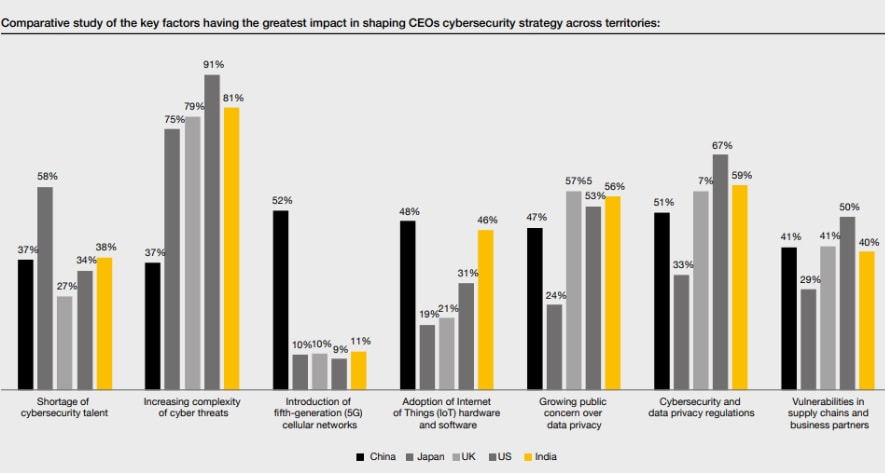Organic growth, operational efficiencies and launch of new product or service are the top three priorities for Indian CEOs: PwC India CEO Survey
12 March, 2020
73% India CEOs agree that climate change initiatives will lead to significant new product and service opportunities for their respective organisations.
- Only 27% of India CEOs believe that the economic scenario would improve over the next 12 months
- 48% are optimistic that privacy regulations designed by the government will increase consumer trust and maintain business competitiveness.
- 73% of CEOs are concerned about the availability of key skills although over 90 per cent believe their organisation has not made ‘significant progress’ in establishing a comprehensive upskilling programme.
New Delhi, 12 March 2020: A majority of India CEOs continue to be worried about the availability of skilled manpower, while only 35% of them are ‘extremely concerned’ about cyber threats and see it as a serious issue. 43% of India CEOs believe the Internet (including social media) divides people, spreads misinformation and facilitates political manipulation. This is according to PwC’s India Outlook of the Global CEO Survey, 2020, ‘Identifying opportunities to make India fit for future’. A total of 63 India CEOs were surveyed for this report, wherein ‘the future of digital privacy’ (setting up guard rails in cyberspace), ‘workforce upskilling challenges’ and impact of climate change comprised three of the core concerns in India.
Data privacy and cybersecurity
India CEOs are more positive as compared to global CEOs when it comes to believing governments are designing privacy regulations that both increase consumer trust and maintain business competitiveness. When it comes to cyber threats, only 35% of India CEOs are ‘extremely concerned’ (compared to 53% in the US, and 42% in the UK) about cyber threats and see it as a serious issue. This is more so because recognition of cyber threats is relatively low in India at the management level, leading to low reporting maturity. However, 81% India CEOs feel the increasing complexity of cyber threats. This is more aligned to the CEO sentiment in developed nations such as the US (91%) and the UK (79%).
Upskilling
For India CEOs, the top challenges their organisations currently face in their upskilling efforts are as follows:
- Defining the priority skills for the future, in the context of their business
- Ability to drive an organisation-wide upskilling agenda.
- Retaining employees who have been upskilled
- Ability of employees to learn new skills needed for the future
- Motivating and incentivising employees to learn and apply their learning
- Most importantly, being able to build a ‘burning platform’ among the leadership to prioritise this critical requirement
For India CEOs, Artificial Intelligence (24%), Cybersecurity (16%), Digital privacy (14%) and Internet of Things (14%) are the most important emerging technology areas for businesses and governments to collaborate, in order to build trust in society. But ironically, 58% of India CEOs cited lack of understanding on how AI models/applications make decisions. Thus, while CEOs are optimistic about AI, they are also aware that the ‘black box’ problem of AI, where an output cannot be explained, needs to be addressed in order to increase the adoption of organisation-wide AI use cases. To reduce this trust deficit, companies need a responsible version of AI wherein concerns around interpretability, ethics and governance are taken care of. Once this happens, AI and related technological advances will progressively solve the challenges to remove subjective biases that exist in society, unlocking far-reaching benefits.
Climate change
More and more CEOs the world over have begun to understand the undeniable link between balance sheets and climate change, and the importance to be sustainable and fit for future. Today 66% of India CEOs are concerned about climate change and environmental damage, while 17% of CEOs in India compared to 5% in 2019 ‘strongly agree’ that climate change initiatives will lead to significant new product and service opportunities for their organisations.
Notes to the editor:



About PwC
At PwC, our purpose is to build trust in society and solve important problems. We’re a network of firms in 157 countries with over 276,000 people who are committed to delivering quality in advisory and tax services. Find out more and tell us what matters to you by visiting us at www.pwc.com.
PwC refers to the PwC network and/or one or more of its member firms, each of which is a separate legal entity. Please see www.pwc.com/structure for further details.
© 2020 PwC. All rights reserved
Contact us














